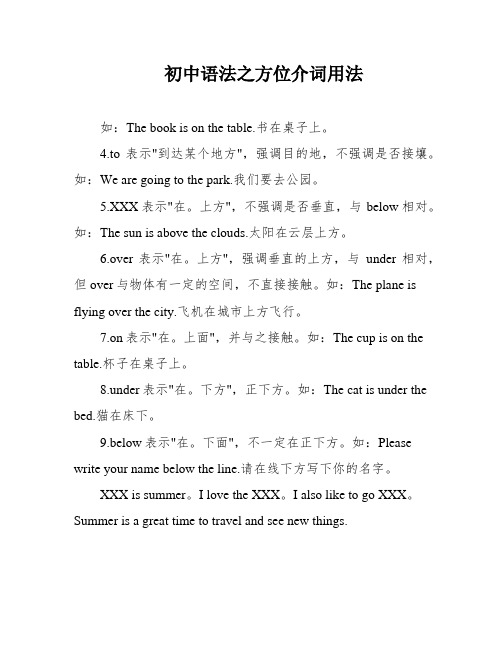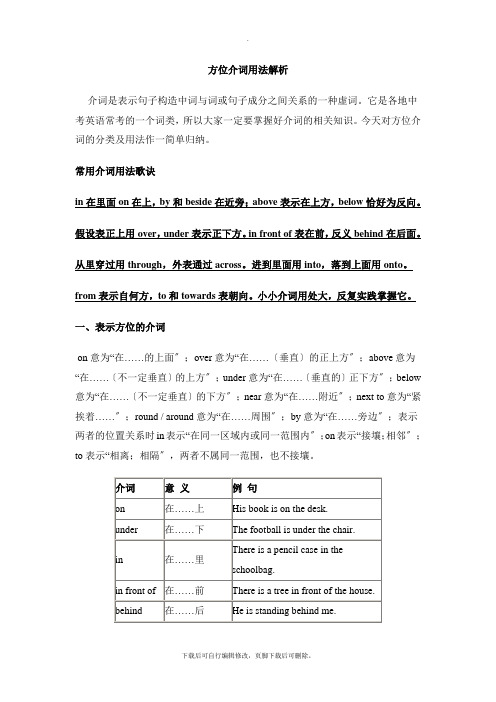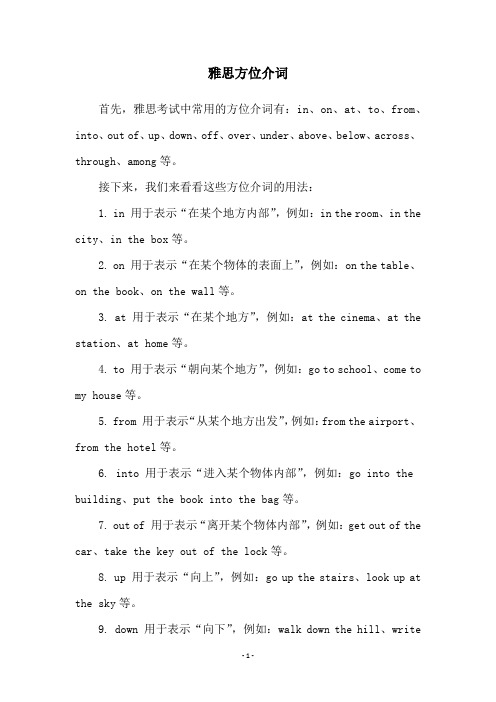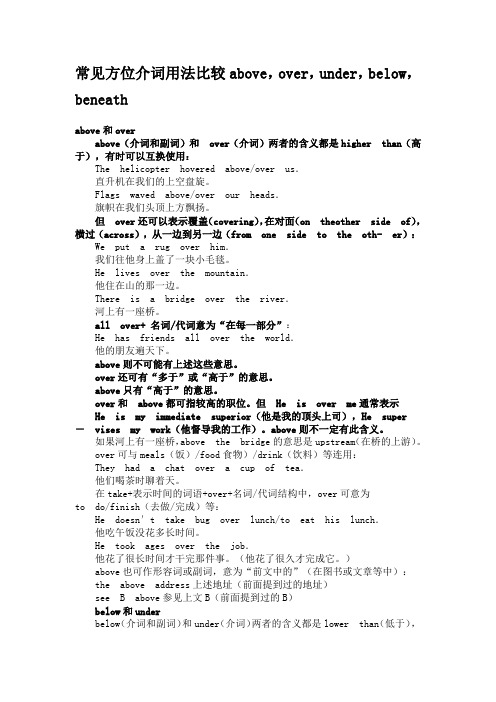方位介词on_over和above_below和under的用法区别
比较above,over,under,below,beneath

常见方位介词用法比较above,over,under,below,beneathabove和overabove(介词和副词)和 over(介词)两者的含义都是higher than(高于),有时可以互换使用:The helicopter hovered above/over us.直升机在我们的上空盘旋。
Flags waved above/over our heads.旗帜在我们头顶上方飘扬。
但 over还可以表示覆盖(covering),在对面(on theother side of),横过(across),从一边到另一边(from one side to the oth- er):We put a rug over him.我们往他身上盖了一块小毛毯。
He lives over the mountain.他住在山的那一边。
There is a bridge over the river.河上有一座桥。
all over+ 名词/代词意为“在每一部分”:He has friends all over the world.他的朋友遍天下。
above则不可能有上述这些意思。
over还可有“多于”或“高于”的意思。
above只有“高于”的意思。
over和 above都可指较高的职位。
但 He is over me通常表示He is my immediate superior(他是我的顶头上司),He super- vises my work(他督导我的工作)。
above则不一定有此含义。
如果河上有一座桥,above the bridge的意思是upstream(在桥的上游)。
over可与meals(饭)/food食物)/drink(饮料)等连用:They had a chat over a cup of tea.他们喝茶时聊着天。
在take+表示时间的词语+over+名词/代词结构中,over可意为to do/finish(去做/完成)等:He doesn′t take bug over lunch/to eat his lunch.他吃午饭没花多长时间。
初中语法之方位介词用法

初中语法之方位介词用法如:The book is on the table.书在桌子上。
4.to表示"到达某个地方",强调目的地,不强调是否接壤。
如:We are going to the park.我们要去公园。
5.XXX表示"在。
上方",不强调是否垂直,与below相对。
如:The sun is above the clouds.太阳在云层上方。
6.over表示"在。
上方",强调垂直的上方,与under相对,但over与物体有一定的空间,不直接接触。
如:The plane is flying over the city.飞机在城市上方飞行。
7.on表示"在。
上面",并与之接触。
如:The cup is on the table.杯子在桌子上。
8.under表示"在。
下方",正下方。
如:The cat is under the bed.猫在床下。
9.below表示"在。
下面",不一定在正下方。
如:Please write your name below the line.请在线下方写下你的名字。
XXX is summer。
I love the XXX。
I also like to go XXX。
Summer is a great time to travel and see new things.XXX activities。
I also enjoy reading during the summer。
I like to sit outside and read a book in the sunshine。
It's a great way to relax and unwind。
I usually choose light and easy reads for the summer。
北师大版英语七年级上册Unit2方位介词用法解析

方位介词用法解析介词是表示句子构造中词与词或句子成分之间关系的一种虚词。
它是各地中考英语常考的一个词类,所以大家一定要掌握好介词的相关知识。
今天对方位介词的分类及用法作一简单归纳。
常用介词用法歌诀in在里面on在上,by和beside在近旁;above表示在上方,below恰好为反向。
假设表正上用over,under表示正下方。
in front of表在前,反义behind在后面。
从里穿过用through,外表通过across。
进到里面用into,落到上面用onto。
from表示自何方,to和towards表朝向。
小小介词用处大,反复实践掌握它。
一、表示方位的介词on意为“在……的上面〞;over意为“在……〔垂直〕的正上方〞;above意为“在……〔不一定垂直〕的上方〞;under意为“在……〔垂直的〕正下方〞;below 意为“在……〔不一定垂直〕的下方〞;near意为“在……附近〞;next to意为“紧挨着……〞;round / around意为“在……周围〞;by意为“在……旁边〞;表示两者的位置关系时in表示“在同一区域内或同一范围内〞;on表示“接壤;相邻〞;to表示“相离;相隔〞,两者不属同一范围,也不接壤。
二、表示运动方向的介词across意为“从……外表穿过〞,或沿某一条线的方向而进展的动作;through 意为“从……内部穿过〞,past和by表示“从旁边经过或路过〞。
如:Please be careful when you go ________ the street.Look! The mosquito is trying to fly ________ the window.We often go ________ a bakery on our way to school.。
aboveoverbelowunder这四个词用法

aboveoverbelowunder这四个词用法above和over都可表示“高于”,区别为:above表示“离开某物的上方”,强调高于某一点或某一物体,但不一定在垂直的上方。
另外,above还可指温度、数量、年龄等。
如:The temperature will stay above zero in the daytime.白天温度将在零度以上。
There is a light above the table.桌子上方悬挂着一盏灯。
(above不强调正上方)over表示垂直的上方或正上方,两物体之间有一定距离。
如:There is a stone bridge over the river.河上有座石桥。
(不能用above)below与under区别一两者都可表示“低于”,under 要紧表示垂直在下的正下方,而below 则不一定表示正下方。
区别二两者均可表示数量方面的“少于”,但在现代英语中,以用under 为多见。
如:He can’t be much below [under] sixty. 他的年龄不可能比60 岁小专门多。
There were under forty people at the meeting. 参加会议的人不足40 人。
It took us under an hour. 我们用了不到1 个小时。
注:在现代英语中,below 表示“少于”,要紧用于表示温度、高度以及有纵向标准可比的情形。
如:This place is below sea level. 此地在海平面以下。
The temperature is two degrees below zero. 温度是零下2 度。
区别三若表示一物被另一物所覆盖,则通常用under。
如:She crept in beside him under the bedclothes. 她钻进被窝躺在他身旁。
区别四表示职位、级别等关系时,用under 表直截了当关系,用below 表非直截了当关系。
雅思方位介词

雅思方位介词首先,雅思考试中常用的方位介词有:in、on、at、to、from、into、out of、up、down、off、over、under、above、below、across、through、among等。
接下来,我们来看看这些方位介词的用法:1. in 用于表示“在某个地方内部”,例如:in the room、in the city、in the box等。
2. on 用于表示“在某个物体的表面上”,例如:on the table、on the book、on the wall等。
3. at 用于表示“在某个地方”,例如:at the cinema、at the station、at home等。
4. to 用于表示“朝向某个地方”,例如:go to school、come to my house等。
5. from 用于表示“从某个地方出发”,例如:from the airport、from the hotel等。
6. into 用于表示“进入某个物体内部”,例如:go into the building、put the book into the bag等。
7. out of 用于表示“离开某个物体内部”,例如:get out of the car、take the key out of the lock等。
8. up 用于表示“向上”,例如:go up the stairs、look up at the sky等。
9. down 用于表示“向下”,例如:walk down the hill、writedown the phone number等。
10. off 用于表示“离开某个物体表面”,例如:get off the bus、take the hat off等。
11. over 用于表示“在某个物体之上”,例如:fly over the city、put the blanket over the bed等。
above over below under这四个词用法

above over below under这四个词用法above和over都可表示“高于”,区别为:above表示“离开某物的上方”,强调高于某一点或某一物体,但不一定在垂直的上方。
另外,above还可指温度、数量、年龄等。
如:The temperature will stay above zero in the daytime.白天温度将在零度以上。
There is a light above the table.桌子上方悬挂着一盏灯。
(above不强调正上方)over表示垂直的上方或正上方,两物体之间有一定距离。
如:There is a stone bridge over the river.河上有座石桥。
(不能用above)below与under区别一两者都可表示“低于”,under 主要表示垂直在下的正下方,而below 则不一定表示正下方。
区别二两者均可表示数量方面的“少于”,但在现代英语中,以用under 为多见。
如:He can’t be much below [under] sixty. 他的年龄不可能比60 岁小很多。
There were under forty people at the meeting. 参加会议的人不足40 人。
It took us under an hour. 我们用了不到1 个小时。
注:在现代英语中,below 表示“少于”,主要用于表示温度、高度以及有纵向标准可比的情况。
如:This place is below sea level. 此地在海平面以下。
The temperature is two degrees below zero. 温度是零下2 度。
区别三若表示一物被另一物所覆盖,则通常用under。
如:She crept in beside him under the bedclothes. 她钻进被窝躺在他身旁。
区别四表示职位、级别等关系时,用under 表直接关系,用below 表非直接关系。
under below的用法

常见方位介词用法比较above,over,under,below,beneathabove和overabove(介词和副词)和over(介词)两者的含义都是higher than(高于),有时可以互换使用:The helicopter hovered above/over us.直升机在我们的上空盘旋。
Flags waved above/over our heads.旗帜在我们头顶上方飘扬。
但over还可以表示覆盖(covering),在对面(on theother side of),横过(across),从一边到另一边(from one side to the oth- er):We put a rug over him.我们往他身上盖了一块小毛毯。
He lives over the mountain.他住在山的那一边。
There is a bridge over the river.河上有一座桥。
all over+ 名词/代词意为“在每一部分”:He has friends all over the world.他的朋友遍天下。
above则不可能有上述这些意思。
over还可有“多于”或“高于”的意思。
above只有“高于”的意思。
over和above都可指较高的职位。
但He is over me通常表示He is my immediate superior(他是我的顶头上司),He super-vises my work(他督导我的工作)。
above则不一定有此含义。
如果河上有一座桥,above the bridge的意思是upstream(在桥的上游)。
over可与meals(饭)/food食物)/drink(饮料)等连用:They had a chat over a cup of tea.他们喝茶时聊着天。
在take+表示时间的词语+over+名词/代词结构中,over可意为to do/finish(去做/完成)等:He doesn′t take bug over lunch/to eat his lunch.他吃午饭没花多长时间。
方位介词知识点总结

方位介词知识点总结常见的方位介词有:in, on, at, by, near, next to, between, behind, in front of, above, below, under, over等。
下面将分别介绍它们的用法和搭配。
1. in介词"in"用来表示物体在某个范围或空间之内。
比如:- There is a cat in the box.(盒子里有一只猫。
)- She is in the living room.(她在客厅里。
)"in"还可以用来表示某个月、季节、年代或年龄段。
比如:- I was born in 1990.(我是1990年出生的。
)- We have a party in December.(我们在12月份举办派对。
)2. on介词"on"用来表示物体在某个平面或表面上。
比如:- There is a cup on the table.(桌子上有一个杯子。
)- The book is on the shelf.(书放在书架上。
)此外,“on”还可以表示抽象的位置,比如:- He is on the phone.(他在打电话。
)3. at介词"at"用来表示物体在某个具体的位置。
比如:- I am at home.(我在家。
)- We will meet at the cafe.(我们会在咖啡馆见面。
)"at"还可以表示某个时间点。
比如:- Let's meet at 7 o'clock.(我们7点见。
)- I will see you at lunchtime.(午餐时间见。
)4. by介词"by"用来表示通过某个方式或交通工具来到某个地方。
比如:- He came by bus.(他乘公交车来了。
)- We can go by train.(我们可以坐火车去。
- 1、下载文档前请自行甄别文档内容的完整性,平台不提供额外的编辑、内容补充、找答案等附加服务。
- 2、"仅部分预览"的文档,不可在线预览部分如存在完整性等问题,可反馈申请退款(可完整预览的文档不适用该条件!)。
- 3、如文档侵犯您的权益,请联系客服反馈,我们会尽快为您处理(人工客服工作时间:9:00-18:30)。
7B第一单元检测试卷一、根据句子意思以及汉语或首字母提示,填写正确得单词。
(10分)1. My_____ (理想的) home is the one with lots of trees and flowers in thegarden.2.There are some small shops ________ (在…..对面) our school.3.What’s on the ________ (架子) ? There are a lot of books on them.4.He often ________(爬)a ladder to get upstairs onto the second floor.5.The _________ (第九)lesson is a little easy.6. The wooden______ desk is made of wood.7. You should be friendly________ to your friends because they are all kind to you.8. My English teacher lives next to my house. She is my neighbour_______9. It’s too noisy (吵闹,喧哗). Let’s find a quiet________ place to talk about our plan.10. His brother is having a shower in the bathroom____________二、根据句子意思,用所给词得正确形式填空。
(10分)1. Do you want _______ (live) in a house in the country?2. Everyone in our family _____ (like) to watch Lucky 52,.3. Liu Xiang is good at _______(run).4. I tell the students _______(not talk) in class.5. It takes him two hours _______ (finish) _______(do) his homework.6. Do you know how many _________(month) there are in a year?7. Simon________(call) Jack______(tell) him about his new school atpresent.8.Will she __share_____(share) her presents with you?、选择填空。
(15分)1.、 1. Jim is ________11-year-old boy.A .an B. a C .the D. /2. We can find clean bowls and plates in the kitchen________.1.sofa B. computer C. cupboard D. Fridge3. _______ is the capital of Britain.1.Paris B. London C. Washington D.C. D. Sydney4. Which book is _________, this one or that one ?A. betterB. bestC. the betterD. good5. Which is your favourite after you have seen so many houses?A. the biggest oneB. the bigger oneC. the big oneD. the biggest ones6. The teacher asked us to listen to her_______.1.carefully B. careful C. more careful D. Careless7. I want to buy this pair of jeans. Can I_______?A. try on them B .try them on C. try it on D. try on it 8. Sandy scored_______ points , and she came _____on the billboard.A. ninety-eighth, fifthB. ninety-eight, fifthC. ninety-eight, fiveD. ninety-eighth, five9. Lin Tao and I live in the same building. But he lives two floors _____me.A. onB. overC. underD. below10. He sits between______.A. you and sheB. you and herC. she and youD. her and you11. We read 10 206 like this________.A. one thousand, two hundred and sixB. one thousands, two hundred and sixC. ten thousand, two hundred and sixD. ten thousand, two hundred six12. They will arrive _______China _______September 2nd.A. in, onB. at, fromC. in, inD. at, on13._________ the students will go to the island for the picnic.1.Two hundred of B. Two hundred C. Two hundreds of D. Hundreds of14. Im listening to the music_____ my sister is playing with the cat. A. when B. while C. but D. or15. -------I am going on a trip to Xi’an next week., ------- _________.A. Have a good timeB. Thank youC. It’s goodD. Good idea1.Where would2.There are in my house3.different from mine4.is lots of5.is between and6.house with7.What’s doing四、根据要求改写句子。
(10分)1.I’d like to sit next to the supermarket. (划线部分提问)2. My house has two floors. (同义句)3. His home is not the same as my home. (同义句)4. It rains a lot in Thailand. (同义句)5. There is a ruler on the pencil-box. there is an English book under it. (同义句)6. I live in a house. It has ten rooms. (同义句)7.Amy is playing the piano in the next room.(划线部分提问)五、填入适当的介词或副词。
(5分)1.There is an old bridge______ the river.2. I like the skirt ___ some flowers on it.3. Can you finish the work ______his help?4. The boy is looking ______ the sea _______the window5. It’s quite cold. The temperature is ____0ºC.6. You can’t see the hat. It’s ____ the door.7. Wash your hands _______ meals.8. Don’t stay _____. Please come in.9. Be friendly _____the animals. They are our friends.六、翻译句子。
(10分)1.他经常同时听音乐和写信。
2.我每天至少要散步半小时。
3. 你住在哪层楼?我和我的家人住在三楼。
4.在圣诞节早晨,孩子们迫不及待地打开礼物。
5.坐在扶手椅上看电视很舒服。
七、完形填空(10分)Swimming is very popular in summer. People like swimming in summer because water makes them 1 cool. But if you swim in a 2 place, it may not be safe(安全)These years, more than ten people 3 while they were enjoying themselves in the water and 4 of them were students.But some people are 5 not careful in swimming.They often think they swim so 6 that nothing can happen(发生)to them in water. Summer is here again. If you go swimming in summer, don’t forget 7 better swimmers have died (死) in water. They died because they were not careful, not because they 8 swim. So don’t get into water when you are alone(单独的). 9 there is a “No Swimming” sign, don’t get into water, 10. If you remember these, swimming will be safer.( )1. A. felt B. feel C. feeling D. to feel( )2. A. difficult B. small C. right D. Wrong( )3. A. died B. die C. have died D. will die( )4. A. much B. most C. lot D. More( )5. A. yet B. already C. still D. Even( )6. A. fast B. often C. well D. hard( )7. A. what B. that C. which D. who( )8. A. couldn’t B. wouldn’t C.needn’t D. mustn’t( )9. A. Because B. Though C. Whether D. If( )10 A. either B. nor C. also D. too八、阅读(20分)AIt is the afternoon of the Mid-autumn Day. All Yangyang’s friends from London are in his home. They are going to have a dinner party.Yangyang is showing them some photos in the sitting room. His parent’s Mr and Mrs Zhang are cooking in the kitchen. His sister is helping them.Dinner begins at 6:30. All the young people are sitting at the table. Dishes are coming one after another. They all smell (闻起来) wonderful and taste delicious. Everybody enjoys the meal except (除了) Helen. She can not use her chopsticks. She tries again and again and makes the others laugh(笑). At last she has to use a spoon(勺子).Near the end (结束) of the dinner, Yangyang’s parents come and sit between Jack and May. They are happy to be with these young people.After the dinner, Yangyang’s father drives the children to the station. They are going totake the night train to Shanghai, for a short visit.( ) 1.All of Yangyang’s friend’s come from ___________.A. EnglandB. AmericaC. AustraliaD. Canada( ) 2.The Chinese meaning of “chopsticks” is __________.A.叉子 B盘子 C 筷子 D 铲子( ) 3.The Chinese meaning of “enjoy” is _________A 观赏B 品尝C 狼吞虎咽 D细嚼慢咽( ) 4.The children laugh because ___________. A. the food is very delicious.B. they are happy with YangyangC. Mr and Mrs Zhang are very nice to themD. Helen can not use her chopsticks.( ) 5.The children are going to the train station ______ A. on foot B. by bus C. by taxi D. in Mr Zhang’s carBAmerican people like to say “Thank you” when others help them or say something kind to them. People of many countries do so, too. It is a very good habit. You should say “Thank you” when someong passes you the salt on the table, when someone walking ahead of you keeps the door open for you, when someone says you have done your work well, or you have bought a nice thing, or your city is very beautiful. “Thankyou” is used not only between friends, but also between parents and children, brothers and sisters.“Excuse me” is another short sentence they use. When you hear someone say behind you, you know that someone wants to walk past you without touching you. It’s not polite tobreak (打断)others when they are talking. If you want to speak to one of them, say“Excuse me” first, and then begin talking. You should also do so when you begin to cough or make any noise before others.Let’s learn to say “Thank you” and “Excuse me”.( ) 1.You should say “Thank you” when ___________A. You say something kind to othersB. You help others.C. Someone helps you.D. You need others to help you.( ) 2.From the passage we know “Thank you” is ___________ed in the world.ed more often than “Excuse me”ed only by Americansed only between friends( ) 3.You should say “Excuse me’’ if you want to ________A. coughB. make some noiseC. go firstD. all of the above( ) 4. When you are going to ask someone to tell you the way, you should say “________”A. Thank youB. That’s very kind of youC. Excuseme D. I’m sorry ( ) 5.This passage mainly tells us the way__________A. to be happyB. to be politeC. to help othersD. to learn from Americans九、写作。
